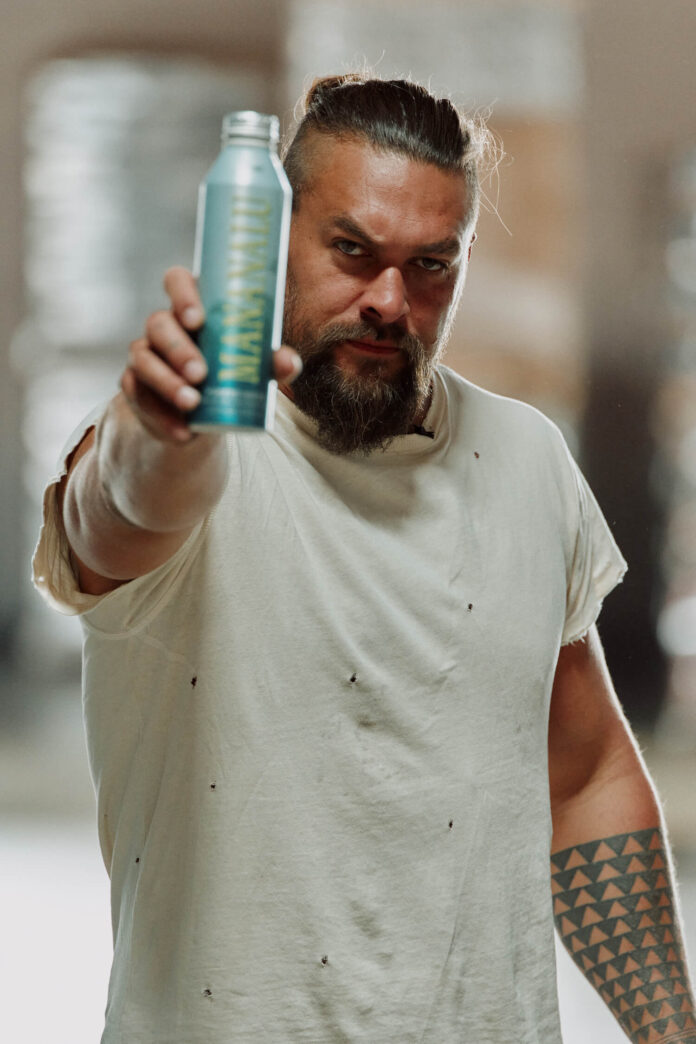Since its launch in 2019, Manunalu, the aluminum bottled water label launched by Jason Momoa, has already made a sizable dent in the planet’s single-use plastic problem. And according to the company’s VP of Sustainability, it’s just getting started.
One could say that “Aquaman” star Jason Momoa took the titular role a little too seriously. Less than a year after the film’s 2018 release, Momoa launched Mananalu, a bottled water company with a strong environmental mission to eliminate single-use plastic water bottles by offering purified water in 100 percent recyclable aluminum cans. The star has long been an outspoken environmental advocate and conservationist, particularly when it comes to water issues and his home state of Hawaii. Momoa has lent his voice to a range of environmental and humanitarian issues including joining the protest against the Thirty Meter Telescope on Mauna Kea on Hawaii’s big island, a 2019 appearance in front of world leaders at the United Nations where he highlighted the severe impacts of climate change and ocean pollution, and narrating the award-winning 2023 documentary on regenerative agriculture, “Common Ground.”
Mananalu, a carbon-neutral, plastic-negative company, isn’t just offering consumers a celeb-backed plastic-free alternative, it is actively engaging in practices that remove more plastic from the environment than it uses and aims to reinforce responsible consumer behavior. For every bottle sold, Mananalu, in partnership with rePurpose Global, removes the equivalent of one plastic bottle from ocean-bound waste. The brand’s products are designed with sustainability in mind, featuring resealable and infinitely recyclable aluminum bottles. This choice of material significantly reduces the environmental footprint associated with traditional plastic water bottles, aligning with Momoa’s vision of a more sustainable, eco-conscious world.
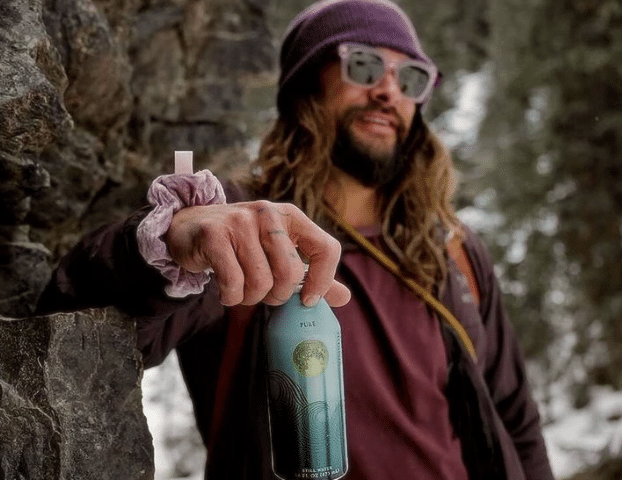
In 2022, the company partnered with Hawaiian Airlines, helping the carrier remove single-use plastic water bottles from flights to and from Los Angeles. Momoa was on the inaugural flight to serve the water himself — a stunt that brought the brand more than 4.5 billion social media impressions. And every one of those count as the label takes on the momentous task of removing single-use plastic. According to Plastic Oceans International, more than 380 million tons of plastic are produced every year, and as much as 50 percent of that is for single-use purposes.
The company’s “Drink One, Remove One” initiative has been an enormous success thus far in removing plastic from the environment and educating consumers on the impact; for every bottle of water sold by Mananalu, the company commits to removing the equivalent of one plastic bottle from environments at risk of contributing to ocean plastic pollution. So far, the company says it has prevented the equivalent of nearly 16 million plastic bottles from entering the ocean. Mananalu’s plastic removal has contributed to the meaningful employment of 79 waste workers in Bekasi, Indonesia. By prioritizing low-value plastics, such as wrappers and bags, Mananalu has funded the removal of more than 500,000 pounds of plastic waste before it could enter the ocean.
We caught up with Aaron White, VP of Sustainability at Manunalu to discuss the mission-led water brand. White joined the company in 2020 as one of the three founding members after spending more than a decade in humanitarian relief work in Africa. He now works to offset the brand’s carbon footprint by building out its efforts like the “Drink One, Remove One” initiative.
This interview is edited for length and clarity.

Ethos: Can you share more about the inception of Mananalu and the inspiration behind its mission to combat plastic pollution in our oceans?
AW: The credit for getting Mananalu off the ground goes to Aquaman himself, Jason Momoa. His passion for environmental sustainability and reducing plastic pollution was truly the driving force behind Mananalu’s inception. From the outset, we committed to making Mananalu a force for positive environmental impact. This meant establishing early-on partnerships with organizations focused on removing plastic waste from the ocean and setting up a business model that incorporates these initiatives into our core operations.
Ethos: How has your decade of experience in Africa influenced your approach to sustainability and water conservation at Mananalu?
AW: I like to say that Africa is where I really “grew up.” The juxtaposition of inequality and privilege was truly eye-opening and gave me a unique perspective on how business, government, and communities could work to make an impact on people and the planet. In the U.S. we tend to have a sanitized view of our impact on the environment because we have solid systems in place that take our trash and recycling out of sight and therefore out of mind.
The experience that truly exposed me to the severity of plastic pollution happened during a visit to Northeastern Kenya, where I encountered the distressing sight of a camel that had died from ingesting plastic bags. It was a heartbreaking moment and sparked a deep sense of responsibility. It became clear that addressing the issue of plastic pollution wasn’t just about cleaning up the environment — it was about rethinking our approach to what we consume and how we dispose of it. The need for sustainable solutions was evident and this is where the concept of Mananalu took root. We wanted to offer a product that served as both a practical alternative to single-use plastic bottles and a catalyst for change, encouraging individuals to make decisions that reduce their environmental footprint.
Ethos: Mananalu has made a significant effort to offset its carbon emissions. Could you elaborate on the specific strategies and programs you’ve implemented to achieve this goal?
AW: We have worked hard to ensure Mananalu is entirely carbon neutral, from the bottle and down through the company’s supply chain. As a Scope 1, 2 and 3 carbon-neutral company, Mananalu is able to leverage carbon offsets that also promote biodiversity with a focus on marine and forest reserves in Indonesia. This geographic focus complements our “Drink One Remove One” program, which actively removes low-value plastic waste from the environment through our partner rePurpose Global.
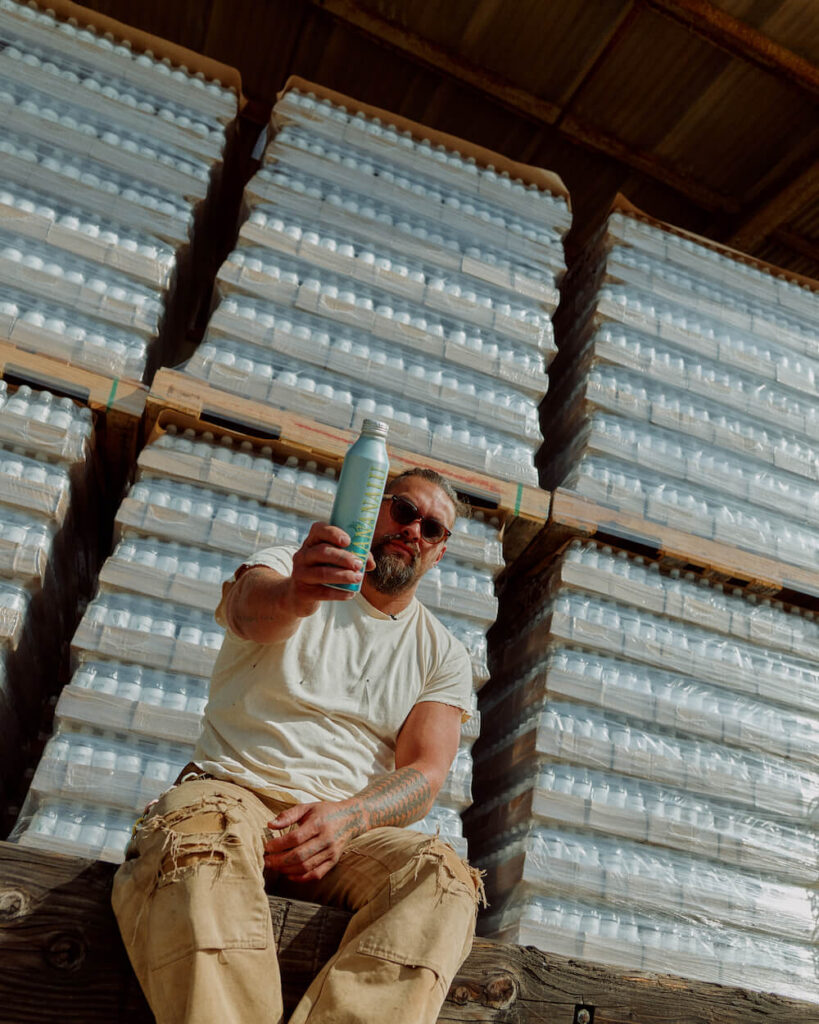
In addition to the carbon offsets, Mananalu is actively working to reduce its per-bottle CO2 emissions year over year with a shift toward co-packing facilities powered through renewables and increasing the amount of recycled aluminum in each bottle. While the progress is incremental, it’s an important step in creating a company and product that lives up to its sustainability mission.
Ethos: With Jason Momoa not just as a founder but also an active environmental advocate, how has his involvement shaped the brand’s direction and public reception?
AW: With Jason Momoa’s involvement, we have a unique platform to raise awareness. We leverage social media, environmentally focused marketing campaigns, and Jason’s network to spread the word about Mananalu and its mission. His devotion to sustainability and reducing plastic pollution was key from the outset. Jason’s vision was to create not just a product, but a movement that encourages a shift toward more sustainable living.
With more than 17M Instagram followers and a tangible passion for life, Jason has a special ability to will things into being that is instrumental in building a movement. Jason is a leading actor, an icon of style and authenticity, and an advocate for life underwater with the United Nations. He’s also Mananalu’s founder and Chief Disruptor, setting the direction for Mananalu as it works to unplastic our planet and make plastic water bottles a thing of the past.
Ethos: Mananalu’s partnership with rePurpose Global is a pivotal aspect of your sustainability strategy. How did this collaboration come about, and how does it amplify your impact on plastic pollution?
AW: When Mananalu was just getting started, we realized that we couldn’t just package the water in aluminum bottles; we had to go one step further to address the plastic pollution crisis. At the same time, we realized that consumers wanted a simple way to take climate action. The confluence of these two insights led us to search for a way to remediate plastic pollution, which is how we found rePurpose Global.
I recently had the unforgettable experience of seeing the incredible work of rePurpose Global firsthand during a trip to India. It illustrated the real-world implications of our partnership with rePurpose Global. Seeing the communities engaged in the collection, sorting, and recycling of plastic waste made the concept behind “Drink One, Remove One” truly come to life. It was not just about mitigating environmental harm but also about supporting livelihoods and empowering communities to manage their waste more effectively. The visit underscored the importance of thoughtful, incentive-driven approaches to environmental sustainability.
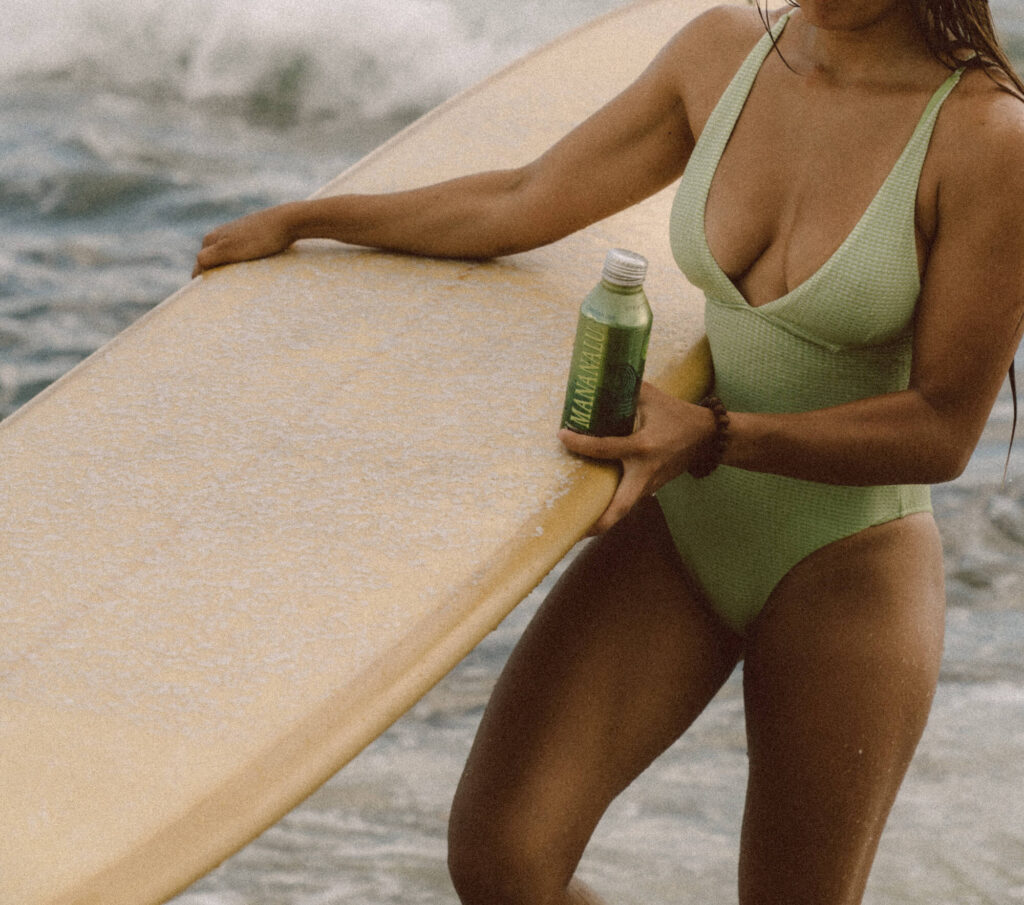
What struck me most was the power of incentives in driving environmental change — providing a direct benefit to foster a cycle of positive impact. By purchasing Mananalu, consumers are not just buying water, but actively participating in a global effort to reduce plastic pollution. Witnessing the enthusiasm and dedication of the individuals on the ground in Goa reinforced our commitment at Mananalu to continue pushing for innovative solutions to environmental challenges. Every action, no matter how small, contributes to a larger, positive impact on both people and the planet.
Ethos: The beverage industry is notoriously competitive. How does Mananalu differentiate itself within this space, particularly regarding sustainability and environmental responsibility?
AW: We see value addition through our sustainability program. Take the “Drink One, Remove One” initiative, for example. Although integrating an offset program to remove plastic waste incurs additional costs, it significantly enhances the product’s value to consumers who are eager for sustainable options. By offering a simple way to contribute to environmental protection, businesses can attract and retain customers who are willing to pay a premium for products that align with their values. This approach not only helps in building a loyal customer base but also differentiates the brand in a crowded market.
By actively reducing emissions and investing in abatement strategies, we also mitigate our environmental impact while capitalizing on the growing demand for responsible brands. This commitment to carbon neutrality is not just about regulatory compliance; it’s a strategic move that can enhance brand reputation, encourage customer loyalty — and potentially — lead to cost savings in operations over time. The journey toward sustainability and carbon neutrality requires initial investment and a strategic shift in operations. However, the long-term benefits, including increased customer loyalty, enhanced brand value, and potential operational efficiencies, can significantly contribute to a business’s profitability.
Ethos: Looking toward the future, what are Mananalu’s long-term goals for expanding its impact on sustainability and potentially influencing other brands to follow suit?
AW: Our ultimate goal is to inspire a shift in consumer behavior toward more sustainable choices and to drive the industry toward more eco-friendly packaging solutions. By choosing Mananalu, consumers are not just hydrating, they are making a conscious decision to be part of the solution in the fight against plastic pollution. We believe that through collective action and sustainable innovation, we can make a significant impact on our planet’s health for generations to come.
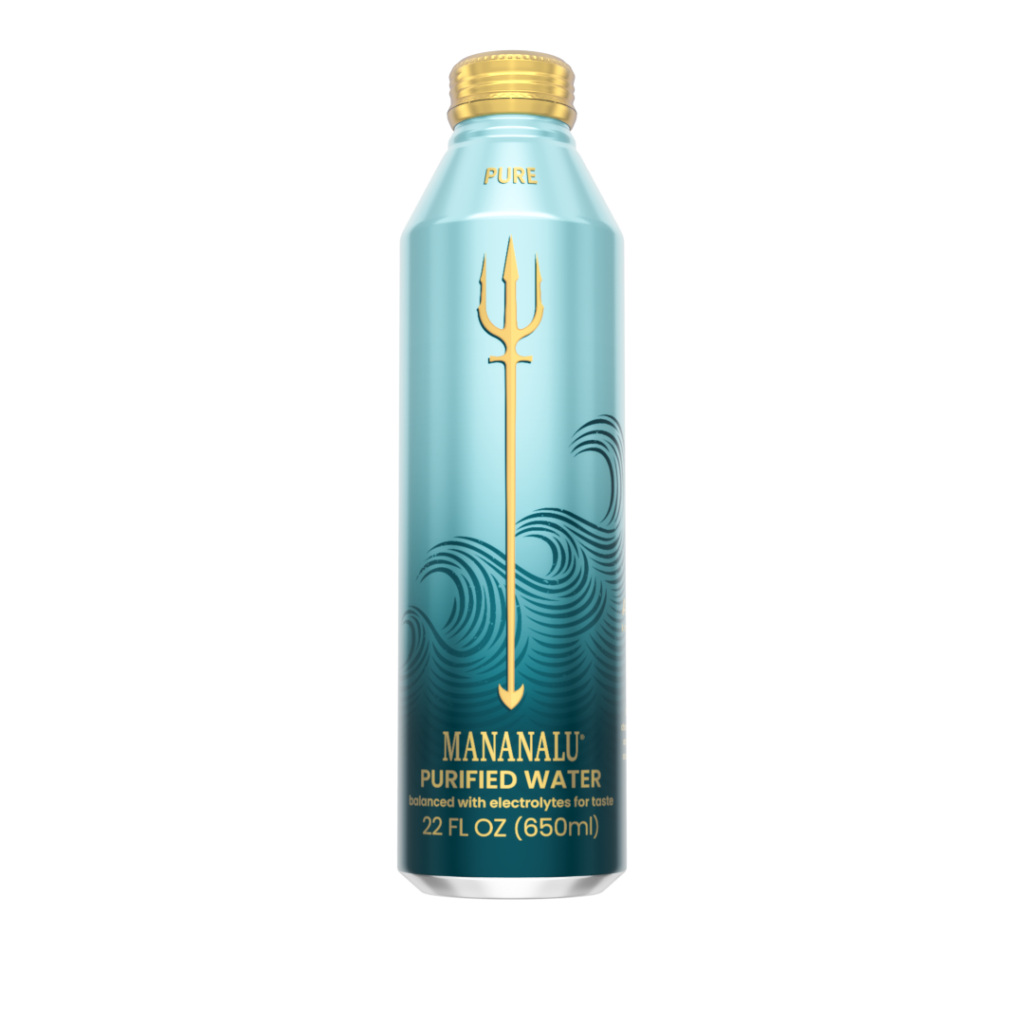
Mananalu is working toward a goal of using 90 percent recycled content in our bottles. If the U.S. followed that lead, it would keep 1.3 million tons of waste out of landfills each year, save enough energy to power 1.5 million homes for one year, generate $1.6 billion in economic activity through material sales, and drastically reduce GHG emissions (equivalent to taking 2.6 million cars off the road for one year).
But replacing plastic with aluminum doesn’t solve the problem. Mananalu doesn’t just want to create another single-use product in a better material; Mananalu wants consumers to refill and reuse its bottles and then recycle them. That’s why we are designing and launching new products that prioritize reusability. As of Q1 2024, all cases of Mananalu will be 100 percent plastic-free. Instead, they’ll be made from recycled corrugated boxes for 12-packs.
Ethos: Celebrating World Water Day (March 22) and Earth Month (April) are important moments for raising awareness. How does Mananalu plan to leverage these occasions to further its mission and engage with a broader audience?
AW: Every day is water day here at Mananalu. It’s why we exist and it’s why our consumers have made the switch from plastic to our refillable aluminum bottles. Even so, we like to ramp up messaging and our marketing campaigns around these occasions to celebrate those who love the ocean (pretty much everyone, right?) and those who are doing something about it. In celebration of World Water Day this year, customers can save ten percent on their Mananalu purchase when they paste this link into their browsers (promo runs through March 25).
This annual campaign for us is our opportunity to “make waves” and bring more people to the proverbial table to have a conversation about why the ocean is important to us. Because if it really is important and it inspires us, then wouldn’t it be worth saving?
Related on Ethos:

